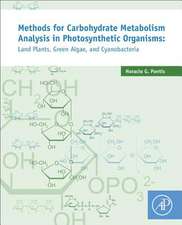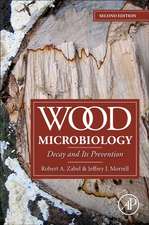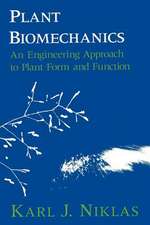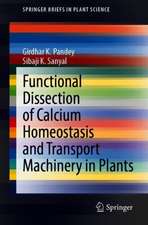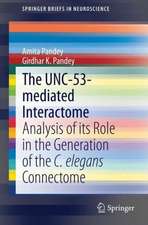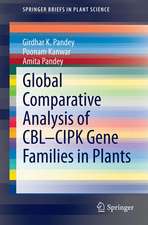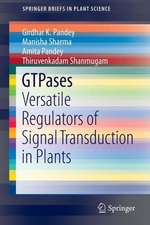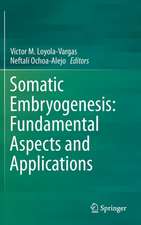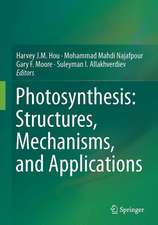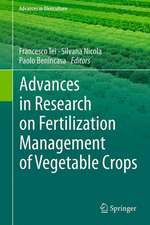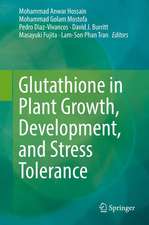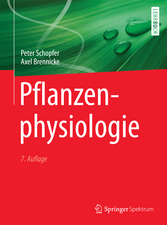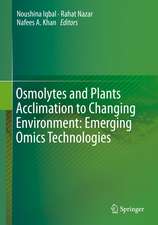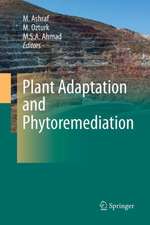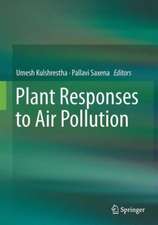Role of Potassium in Plants: SpringerBriefs in Plant Science
Autor Girdhar K. Pandey, Swati Mahiwalen Limba Engleză Paperback – 16 iun 2020
Overall performance of the plant, and operation of metabolic machinery depends upon intracellular K+ homeostasis (K+ uptake and efflux) via K+ channels and transporters acting as mediators of cellular responses during plant development. Unlike animals, plants lack sodium/K+ exchangers; plant cells have developed unique transport systems for K+ accumulation and release. In Arabidopsis thaliana, 71 K+ channels and transporters have been identified and categorized into six families.
Plant adaptive responses to several abiotic and biotic stresses are mediated by regulation of intracellular K+ homeostasis. In this report, we highlight the role of K+ in abiotic and biotic stresses, features of channels and transporters responsible for its homeostasis along with its evolutionary relationship, perception and sensing mechanisms, and K+ deficiency triggering different signaling cascades.
Overall, this book covers the role of K+ in plants would be significantly helpful to research, academic community as well as students to understand the one of the major attributes of plant biology.
Din seria SpringerBriefs in Plant Science
-
 Preț: 345.63 lei
Preț: 345.63 lei -
 Preț: 379.09 lei
Preț: 379.09 lei -
 Preț: 379.09 lei
Preț: 379.09 lei -
 Preț: 375.23 lei
Preț: 375.23 lei -
 Preț: 377.18 lei
Preț: 377.18 lei -
 Preț: 376.80 lei
Preț: 376.80 lei -
 Preț: 378.71 lei
Preț: 378.71 lei -
 Preț: 379.09 lei
Preț: 379.09 lei -
 Preț: 376.59 lei
Preț: 376.59 lei -
 Preț: 374.30 lei
Preț: 374.30 lei -
 Preț: 377.73 lei
Preț: 377.73 lei -
 Preț: 381.59 lei
Preț: 381.59 lei -
 Preț: 375.07 lei
Preț: 375.07 lei -
 Preț: 349.10 lei
Preț: 349.10 lei -
 Preț: 379.86 lei
Preț: 379.86 lei -
 Preț: 479.67 lei
Preț: 479.67 lei -
 Preț: 441.47 lei
Preț: 441.47 lei -
 Preț: 375.45 lei
Preț: 375.45 lei -
 Preț: 377.73 lei
Preț: 377.73 lei -
 Preț: 378.71 lei
Preț: 378.71 lei -
 Preț: 376.22 lei
Preț: 376.22 lei - 15%
 Preț: 460.75 lei
Preț: 460.75 lei -
 Preț: 376.80 lei
Preț: 376.80 lei -
 Preț: 410.77 lei
Preț: 410.77 lei -
 Preț: 376.22 lei
Preț: 376.22 lei
Preț: 376.59 lei
Nou
Puncte Express: 565
Preț estimativ în valută:
72.06€ • 75.24$ • 59.64£
72.06€ • 75.24$ • 59.64£
Carte tipărită la comandă
Livrare economică 05-19 aprilie
Preluare comenzi: 021 569.72.76
Specificații
ISBN-13: 9783030459529
ISBN-10: 3030459527
Pagini: 81
Ilustrații: XI, 81 p. 13 illus., 12 illus. in color.
Dimensiuni: 155 x 235 mm
Greutate: 0.15 kg
Ediția:1st ed. 2020
Editura: Springer International Publishing
Colecția Springer
Seria SpringerBriefs in Plant Science
Locul publicării:Cham, Switzerland
ISBN-10: 3030459527
Pagini: 81
Ilustrații: XI, 81 p. 13 illus., 12 illus. in color.
Dimensiuni: 155 x 235 mm
Greutate: 0.15 kg
Ediția:1st ed. 2020
Editura: Springer International Publishing
Colecția Springer
Seria SpringerBriefs in Plant Science
Locul publicării:Cham, Switzerland
Cuprins
Preface.- 1. Introduction: Overview of Role of potassium.- 2. Potassium Homeostasis.- 3. Potassium uptake and transport system in plants.- 4. Sequence, structure and domain analysis of potassium channels and transporters.- 5. Potassium in plant growth and development.- 6. Potassium in abiotic stress.- 7. Potassium deficiency: A stress signal.- 8. Potassium perception and sensing.- 9. Emerging role of potassium in plants.- 10. Key questions and future perspective.- References.- Abbreviations.- Index.
Notă biografică
Dr. Girdhar Kumar Pandey, Assoc. Professor
Swati Mahiwal, M.Sc.
Delhi University South Campus
Dept. of Molecular Biology
Benito Juarez Road, Dhaula Kuan
110021 New Delhi
India
Delhi University South Campus
Department of Plant Molecular Biology
Benito Juarez, Dhaula Kuan
110021 New Delhi
India
Swati271095@gmail.com
Textul de pe ultima copertă
Potassium (K+) is an essential mineral macronutrient abundantly present in the cytosol which, unlike other macronutrients, is not metabolized and does not integrate into macromolecules. Compared to animal cells, K+ is more abundantly present in plant cells.
Overall performance of the plant, and operation of metabolic machinery depends upon intracellular K+ homeostasis (K+ uptake and efflux) via K+ channels and transporters acting as mediators of cellular responses during plant development. Unlike animals, plants lack sodium/K+ exchangers; plant cells have developed unique transport systems for K+ accumulation and release. In Arabidopsis thaliana, 71 K+ channels and transporters have been identified and categorized into six families.
Plant adaptive responses to several abiotic and biotic stresses are mediated by regulation of intracellular K+ homeostasis. In this report, we highlight the role of K+ in abiotic and biotic stresses, features of channels and transporters responsible for its homeostasis along with its evolutionary relationship, perception and sensing mechanisms, and K+ deficiency triggering different signaling cascades.
Overall, this book covers the role of K+ in plants would be significantly helpful to research, academic community as well as students to understand the one of the major attributes of plant biology.
Overall performance of the plant, and operation of metabolic machinery depends upon intracellular K+ homeostasis (K+ uptake and efflux) via K+ channels and transporters acting as mediators of cellular responses during plant development. Unlike animals, plants lack sodium/K+ exchangers; plant cells have developed unique transport systems for K+ accumulation and release. In Arabidopsis thaliana, 71 K+ channels and transporters have been identified and categorized into six families.
Plant adaptive responses to several abiotic and biotic stresses are mediated by regulation of intracellular K+ homeostasis. In this report, we highlight the role of K+ in abiotic and biotic stresses, features of channels and transporters responsible for its homeostasis along with its evolutionary relationship, perception and sensing mechanisms, and K+ deficiency triggering different signaling cascades.
Overall, this book covers the role of K+ in plants would be significantly helpful to research, academic community as well as students to understand the one of the major attributes of plant biology.
Caracteristici
Addresses an area of major research and development Discusses potassium's role in signaling and regulation of biotic and abiotic stresses Presents recent advances related to nutrient-use-efficiency and potassium deficiency


